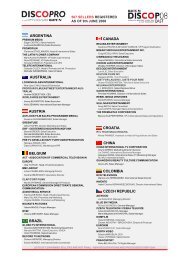discop link • #11
discop link • #11
discop link • #11
- No tags were found...
Create successful ePaper yourself
Turn your PDF publications into a flip-book with our unique Google optimized e-Paper software.
edge that," a few years ago RTL madethe only serious attempt at innovationin the late night schedule, when theyallowed the cameras from their versionof BIG BROTHER to keep runningthrough the night so that viewerscould peep into bedrooms in the earlyhours. Presumably in the hope of seeingsomething that was sadly missingfrom the reality of their own lives. Buteven that small innovation," says Matijasevic,"has now been abandonedand, although RTL still does showsome extra BIG BROTHER footage, inline with their competitors they nowmostly show repeat movies and seriesuntil 1 am when they start KUNOLO-VAC, a two-hour quiz show in whichviewers call in trying to win a bigmoney prize, although this has recentlyattracted criticism from both theregulator and also consumer groupswho think that callers do not alwaysget fair treatment."Matijasevic says much the sameis true of the late night programmingof other Croatian broadcaster such asHTV who broadcast repeat moviesand American series until 3 am afterwhich they switch to a schedule ofmagazine shows and political showsuntil regular morning programmingresumes at 7 am. Nova TV is very similarwith late news followed by importedcomedies and drama until 4 amwhen the station runs a low budgetfeature or TV movie.However, these examples are notthe real low point of Croatian late nightprogramming, that dubious distinctionMatijasevic awards to NET, a localbroadcaster operating out of Kutin,"who invited viewers to send, via SMS,nude photos of themselves, or, better,or worse depending on your viewpoint,clips of them having intercourse."After being reprimanded by theBroadcasting Council, the bodyresponsible for the issuing of Croatianbroadcast licenses, the station toneddown the requests and now, saysMatijasevic, "only show still photographsof male genitalia alongside theowner’s telephone number!"And when not plumbing thedepths of poor taste and indecencymany local stations, reports Matijasevic,"fill much of their late nightschedules with direct response television,urging you to 'call now and youcould be the first on your block to getthe very sharpest knife in history. Ever.Honest.' Or premium rate phone linesoffering to tell your fortune by readingcards or beans or crystal balls."This is also the situation in theCzech Republic where Pavel Krumpar,commercial director at state broadcasterCeska Televize says, "most ofour late night slots are filled withdirect response television," but Krumpardefends this situation, explaining,"the amount of spot advertising CeskaTelevize is allowed to show is verystrictly limited, and therefore we preferto use spots in the daytime andprime time when they can commandRobert Blagman, Managing Partner,Media Ops Inc.much greater sums." By way of illustratingthe significant differences inrevenue generated by spot as opposedto DRT, Krumpar estimatesthat spot advertising, "generatesaround €5.7 million a year, while thedirect response of late night generatesslightly over one quarter of this,at €1.5 million."Krumpar believes this basic economicsis at the heart of the currentmalaise with regional late night schedules."Certainly," he insists, "growth inlate night income, and therefore improvementin the content shown, willonly come with competition, which willforce stations to look for new sourcesof revenue." And on that score he isoptimistic, "I believe this will happen asdigitalisation takes hold over the nexttwo years, and more and more channelsare launched, then, not only willlate-night programmingcompetition increase, but we will seethe emergence of new forms of latenight programming such as downloading,competitions and advertiser generatedcontent."This is a view shared by ATV'sBauer who says, "there has not beenany significant change in the level ofadvertising in late night as mainstreamAustrian advertisers are mainlyinterested in the time period from 1pm through to 12 am. Hence thealternative income formats such asteleshopping, call in programming andthe erotic flat fee deal for providing airtime."However, this is not necessarilythe situation throughout the DISCOPregion. Piotr Socha, a producer atPoland's TVP Rzeszow says, "untilquite recently late night television inPoland used to be associated withendless repeats of series and films,except on public service stationswhich played opera and other programmingof a high culture nature,which they were obliged to play, butwhich would not have rated well instronger slots," although he acceptsthat, "this did offer an opportunity forthose who missed the original transmissionto catch up," he also believesthat it was not the best possible use ofairtime. And, he says, "recently, Polishstations began to realise that latenight might not be the hopeless partof the schedule that had always seen itas being. Over the past few years,"explains Socha, "a number of ideashave been imported from the USA andWestern Europe, based on interactiveparticipation of viewers in competitions,quizzes or game shows." However,there were initially problemssince the companies hired to producesuch series had little or no experienceof them and this lead to a quick turnaround as show after show failed andwas replaced with another doomed tothe same fate."The turning point," reportsSocha, "came with the introduction ofthe CALL TV system, mastered byHungary's Telemedia InteracTV." Thecompany, which Socha describes as,"a global phenomenon," produces programmingfor fifty countries worldwideoperating out of twenty studios. ForPoland alone it produces thirteenhours of programming daily, includinglate night programming for each of36 DISCOP LINK <strong>•</strong> <strong>#11</strong> <strong>•</strong> NOVEMBER 07
















